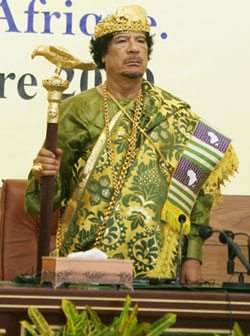
(FinalCall.com) – Libyan leader Muammar Gadhafi “right now is at the peak of his power,” according to Alessandro Bruno, assistant editor of the North African Journal.
Not only does the current head of the African Union “for the first time in his 40 year” reign as leader of the Libyan Jamahiriya enjoy diplomatic relations with all countries including the United States, he has settled colonial disputes with Italy (witness the $5 billion reparations agreement that was signed) and received rapprochement in Western capitals apparently for relinquishing “non-existent” weapons of mass destruction. And, he is planning to visit the U.S. and address the United Nations.
How is it possible for the “Mad Dog of the Middle East” as he was called by President Ronald Reagan, and the “Bin Laden of the 1980s” as suggested by Mr. Bruno, able to transform himself, neutralize his Western foes–and control his domestic opponents, according to Mr. Bruno. He lived in Libya for two years while working for the United Nations.
Many are suggesting Mr. Gadhafi’s image renewal was the result of the deal he cut to hand over the Lockerbie bombing suspects. Statements in the press have also suggested the release of terminal prostate cancer victim Abdelbaset el-Megrahi was for business and humanitarian reasons. He was the only person convicted of the Lockerbie bombing that left 270 dead. Some believe the release was indirectly tied to the “cost” Western powers paid to do business with the North African country.
According to Scotland’s Sunday Herald: “Suspicions that a UK issue of trade and international commerce is being dressed up to resemble a Scottish legal decision to release Megrahi on ‘compassionate grounds’ appeared to be confirmed by Gadhafi’s son, who said (UK prime minister) Blair’s visit in 2007 had laid the foundation of Megrahi’s release. He told the al Mutawassit television channel that: ‘in all the commercial contracts with Britain for Libyan oil and gas, Megrahi was in an issue always on the negotiating table.’ ”
Though Mr. Megrahi’s imprisonment and subsequent release might have been a part of the “cost of doing business” on both sides, according to Mr. Bruno, it is not what “legitimized” Mr. Gadhafi and propelled him into becoming a major player in the international arena.
Relinquishing “so called weapons of mass destruction” is what legitimized Mr. Gadhafi, according to Mr. Bruno, who believes Mr. Gadhafi fabricated claims of weapons of mass destruction. When relinquishing them became the way to reestablish a much-needed relationship with the West, Mr. Gadhafi gladly gave up his “weapons,” which were no more than a part of an image he cultivated with assistance from the West, Mr. Bruno argues.
According to Mr. Bruno, Mr. Gadhafi’s need to rebuild his country’s sagging economy/oil industry and to get out from under sanctions–brought on by accusations of ties to the Lockerbie bombing–had to be weighed against the desire to support revolutionary causes.
Mr. Gadhafi told this reporter he had rethought his support of some causes. During an exclusive interview in 1999 from his office on the outskirts of Tripoli, Mr. Gadhafi called this support, “mistakes made in good faith.” “In the beginning, we supported certain movements too quickly. Take the issue of Northern Ireland: instead of political support to resolve the problem we were involved in supplying arms,” Mr. Gadhafi said.
Mr. Bruno said this apparent metamorphosis was more a change in tactics than a capitulation on what Mr. Gadhafi believed. “Libya needed a lot of foreign investment” to develop its oil industry, said Mr. Bruno.
The problem Libya faced in 1996 was U.S. congressional legislation that applied sanctions and put it on a “terrorist sponsor list.” The sanctions prevented any U.S. companies from doing business with the North African country. In addition, noted Mr. Bruno, most countries were reluctant to do business with Libya for fear of incurring U.S. wrath. “Much of the oil refining equipment is made in the U.S.,” said Mr. Bruno, and in order to upgrade equipment oil companies needed U.S. assistance.
In 2003, Mr. Gadhafi renounced his weapons of mass destruction in effect ending his isolation. Within months, said Mr. Bruno, “deals were signed by American companies including Conoco Phillips and Sonoco Oil. In 2004, Tony Blair paid Gadhafi a visit and before long there were even more deals signed as well as infrastructure upgrades.”
Mr. Gadhafi has since gone on and been able to get Italian Prime Minister Silvio Berlsconi to sign a memorandum pledging a $5 billion compensation package.
“It is a material and emotional recognition of the mistakes that our country has done to yours during the colonial era,” Mr. Berlusconi told reporters at the time. “This agreement opens the path to further cooperation.”
In February, Mr. Gadhafi took over the one-year reign of the African Union. In his inauguration speech, he pledged his “term” to be one “of serious work, not just words. I shall continue to insist that our sovereign countries work to achieve the United States of Africa,” he said, admitting that the journey to completion of this task was an uphill one.
“We are independent states. It is your decision to respond to the call for unity, to push Africa forward towards the United States of Africa,” Mr. Gadhafi stressed.
U.S. President Obama and Libyan leader and AU Chair Gadhafi are scheduled to address the 64th Session of the United Nations on September 23 and Libya holds the presidency of the UN General Assembly and takes its turn as one of the 10 non-permanent members of the Security Council. The Libyan leader is scheduled to speak after President Obama.
Related news:
Col. Gadhafi’s speech streamed live via webcast, September 23, 2009
Welcome to America: Gadhafi at United Nations (FCN, 09-22-2009)
The Nation of Islam Welcomes Muammar Gadhafi (FCN, 09-22-2009)












